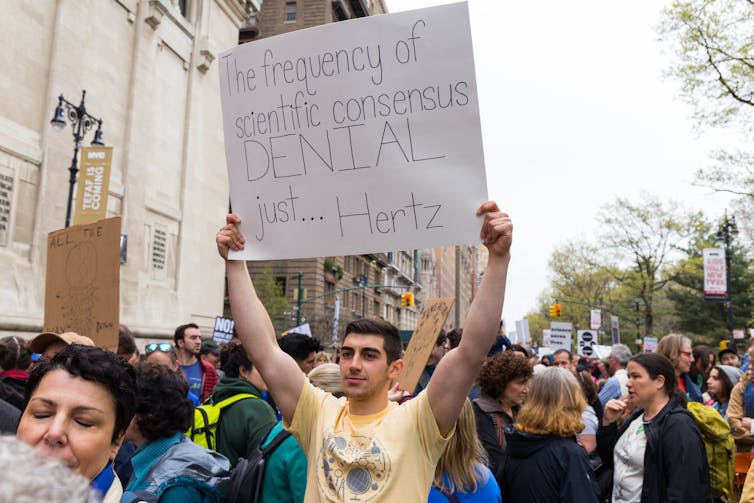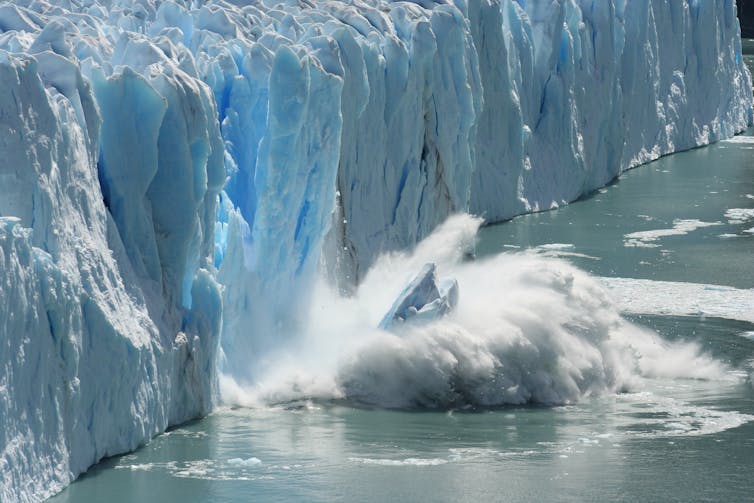Much has been written about our incredible psychological ability to ignore or gloss over the threat of climate change. According to Irina Bokova, director general of UNESCO, “the gap between what we know about the interconnectedness and fragility of our planetary system and what we are actually doing about it is alarming. And it is deepening”. This gap between knowing and doing can be explained, in part, by our tendency to reach for defence mechanisms in response to the realities of climate change.
We deny the reality of climate change, minimise its implications or our responsibility for it, or project the consequences onto far off places or into the future. Such processes can occur in individual thinking; and they can appear in conversation, groups and wider societies as deliberate but unspoken “agreements” not to talk about climate change in polite conversation. These denial tendencies are supported on an even larger scale in society and culture, as climate change is routinely absented or minimised as an issue – in media, government policy or advertising for example.

Meanwhile, the climate crisis deepens. Across the planet, climate change is increasing the likelihood of extreme weather. To be defined as “extreme”, a weather event must be significantly divergent from normal patterns, with accompanying severe impacts, and be historically infrequent (about once every hundred years). They include floods, droughts, wildfires and heatwaves. Such “extreme weather events” are predicted to increase in the future as global warming increases.
It is commonly argued that one reason climate change doesn’t have enough psychological or social traction is because it is perceived as distant – in time and space. And so some commentators, including former NASA scientist James Hansen, have predicted that this kind of direct experience of the manifestations of climate science predictions will increasingly bring the reality of climate change home, breaking through established defences, and finally closing the gap between knowing and doing.
Fossil fuel weather
Is this likely? Perhaps surprisingly, research suggests that in the wake of experiencing extreme weather, people may not consider climate change any more of a threat. For example, while the severe floods in the south-east of England in the winter of 2013-14 were exactly the kind of event predicted by climate scientists for a number of years, those directly experiencing them were found to be “no more knowledgeable, concerned or active in relation to climate change than people without flooding experience”.
Why might this be the case? The cause of such incidents involves an array of factors, and separating out human influence and natural variability in weather systems is challenging. This is why scientists, cautious by profession, talk of climate change “increasing the odds” of extreme weather in general, but rarely weigh in on arguments about specific events. Considering our psychological and social tendency not to attribute worrying events to human-made climate change, the potential power of direct experience to “open our eyes” to climate change is scuppered by the apparent uncertainty in connecting specific events to climate change.
But what if extreme weather events could be attributed to human-induced climate change with confidence? The emerging area of “extreme event attribution” allows us to pose such a question. New research by Noah Diffenbaugh and colleagues at Stanford University is the most ambitious contribution to this field to date. They devise a thorough set of measurements and demand a high burden of proof in quantifying the influence of global warming on unprecedented extreme climate events.
For one of their case studies, the summer decline of Arctic sea ice, overwhelming statistical evidence meant the significant contribution of climate change was “virtually certain”. More generally, anthropogenic climate change has increased the likelihood of the hottest events over more than 80% of the surface area of the Earth.

Triggering action
Diffenbaugh and colleagues refer to the important implications of their research “for climate adaptation and mitigation efforts”, imagined as top-down interventions such as disaster risk management systems. But what interests me are the implications for behavioural and social change, particularly of the potential for extreme event attribution to motivate bottom-up activism and broader engagement with climate change as an urgent issue. Would we be more willing to change our behaviour, get together, act up accordingly, if we had direct experience of an extreme event that is confidently attributed to climate change?
It is certainly tempting to think that combined with direct experience of extreme weather, clearer attribution would be a powerful push factor. But developments in the psychology of defence mechanisms suggest that when we start to feel that threatening situations are getting closer, our defences become more pronounced and manic. We might increase our antagonism for individuals or groups who are bringing the problem to our attention or managing the fallout from extreme events; or uncritically idealise leaders who assert denial (any examples spring to mind?). We might even go overboard in pursuing and cheerleading behaviours deemed environmentally damaging, to reassure ourselves and others that we have nothing to worry about (remember the Republican campaign slogan “Drill, baby, drill”?). This makes sense – we need to work harder, individually and collectively, to deny the reality of climate change when it starts to feel more real.
Despite my reservations, we just can’t be sure what the effects of being able to attribute extreme weather to climate change might be. It is still possible that with a stronger causal narrative, immediate and direct experience of extreme events unlocks the motivation of individuals and communities in ways we have witnessed in other areas of environmental campaigning. Firsthand experience of this kind just might puncture the individual defence mechanisms and socially generated silences that maintain the gap between what we know about climate change, and what we are doing about it.
Originally published at The Conversation
